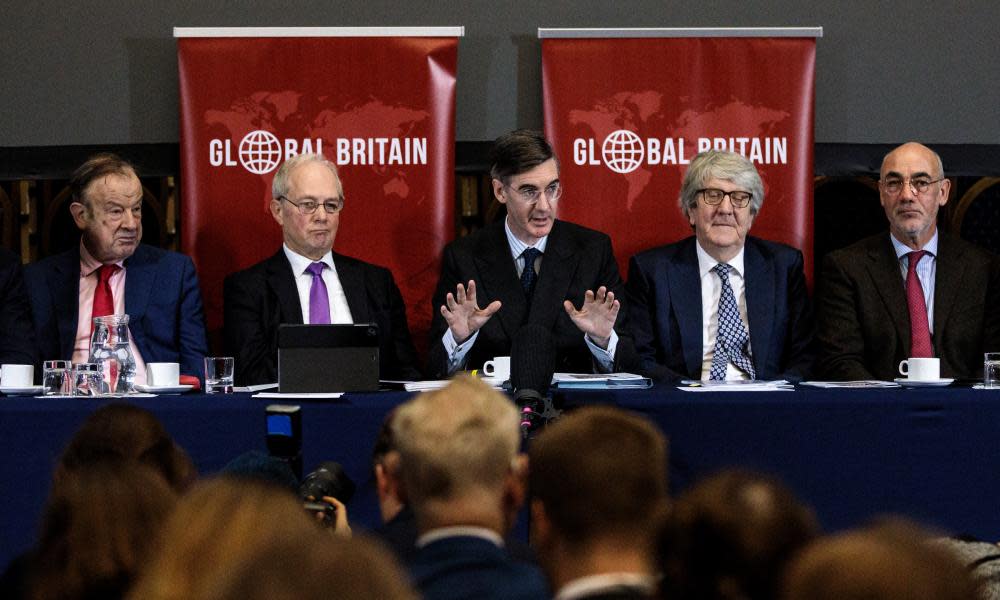Their own private Brussels: why the Brexit zealots can never leave the EU

From the botched coup to the breadth of Jacob Rees-Mogg’s lapels, à la Brezhnev, there is something unmistakably late-era Soviet about the extreme Eurosceptics. As Vytenis Andriukaitis, a Lithuanian member of the European Commission noted on Twitter, the panel of grey men at yesterday’s press conference calling for a no-deal departure from the EU had the air of ageing Bolsheviks who have reached the end of the line. The Tory European Research Group’s efforts to unseat Theresa May might be the worst hardline coup since the 1991 politburo putsch that tried to depose Mikhail Gorbachev.
Gorbachev had been installed as leader by a party establishment that thought he would be controllable. His compromise plans led to the dissolution of the state he was hoping to save, but let’s not stretch the analogy too far.
The point is that the ERG are a strange breed of reactionary-revolutionaries who simultaneously want everything to be new, to stay the same and to go back to how it used to be. Rees-Mogg is the embodiment of the ethos. He was born in 1969, which for cultural reference puts him in the same generation as Blur and Oasis. He is older than Liam but younger than Noel Gallagher. Yet his shtick is prelapsarian England – the static etching of the Edwardian gent framed in an alcove by the toilet in a home counties village pub. But his doctrines come with Leninist zeal. All means are justified by the utopian end; there will be no yummy Brexit omelette without breaking a few eggs. (Not his precious eggs, of course.)
But it is David Davis, not Rees-Mogg who has provided the best illustration recently of what it means to be a Eurosceptic radical. Davis was not original ERG, but he has earned his Brexit buccaneer’s stripes by passing the ordeal of inanity. This requires saying things about the UK’s relationship with the European Union that are so fundamentally wrong as to raise the question of whether the person declaring them is soaring to new heights of cynicism or mining new depths of stupidity.
Davis’s latest contribution to the genre was the observation, made in an article on the Conservative Home website, that “if we need to leave with no deal and negotiate a free trade agreement during the transition period, so be it”. One technical hitch: the transition period is part of the withdrawal agreement, negotiated by May at a time when Davis himself was Brexit secretary. No deal, no transition.
Disregard for facts characterises the hard Brexiteer creed but doesn’t adequately explain it. It isn’t fair to call these people liars or lunatics. Politics is full of misdirection, misperception and wilful misrepresentation. But it contains very few verifiable sociopaths. The underlying motives are mostly the same for everyone: people think they are doing the right thing in service of a just cause.
What I have come to understand from the latest chapter of the Brexit revolution, the sputtering coup, is that it is a mistake to judge the ERG’s actions is if they relate to Britain’s actual membership of the actual EU. This is a category error that remainers and softer leavers repeatedly make. We observe the dynamics in the negotiations in Brussels (the actual Brussels in Belgium) then apply an analysis based on a set of facts assembled from those observations.
But the “Brussels” and the “EU” that the ERG are concerned with are not found in the mundane, temporal spheres of diplomacy, geography and politics. They are ideas; figments of the embittered imagination. They are abstract repositories for a range of anxieties, fears and resentments that have built up over many years in the minds of MPs whose ambitions are unfulfilled, who lack the courage required for a sustained career in top-tier government, or who had a go and failed, or have never been invited to try. The ERG model of Brexit is a deeply personal rage at the failure of Westminster politics to bestow due recognition and show appropriate respect, but projected outwards as a nationalistic grievance myth about the rest of the world failing to honour the greatness of Britain. The hardliners’ good fortune is that their story has a lot of resonance in febrile, insecure times. Their misfortune is that leaving the EU cannot make the pain go away, because they will be the same people outside a customs union as within it. The common external tariff isn’t what hurts.
Theresa May is back in Brussels today, meeting Jean-Claude Juncker to hammer out details of the political declaration that will describe the longer-term relationship between Britain and the EU. It is a tricky, technical business that requires accommodating the interests of 28 countries. That affords May little room for manoeuvre. Inevitably, a section of the Tory party will hate the document. They hate it already, without having read it. And May cannot placate them because she is in the wrong place, very literally. The prime minister is trying to negotiate Britain’s exit from the EU in a real city on a real continent. She can’t do anything for MPs who want to escape the European demons inside their heads.
• Rafael Behr is a Guardian columnist

 Yahoo News
Yahoo News 
